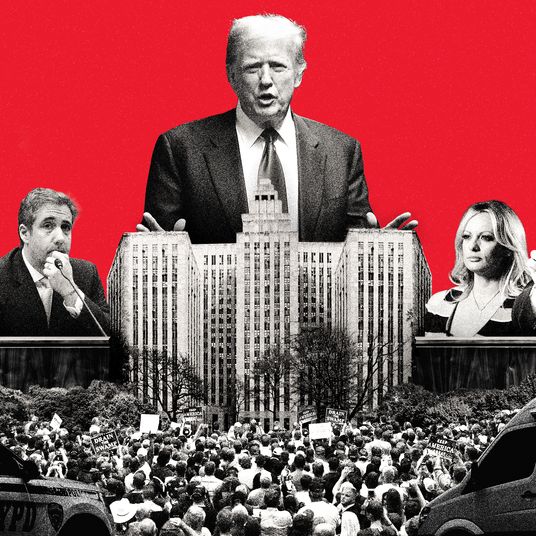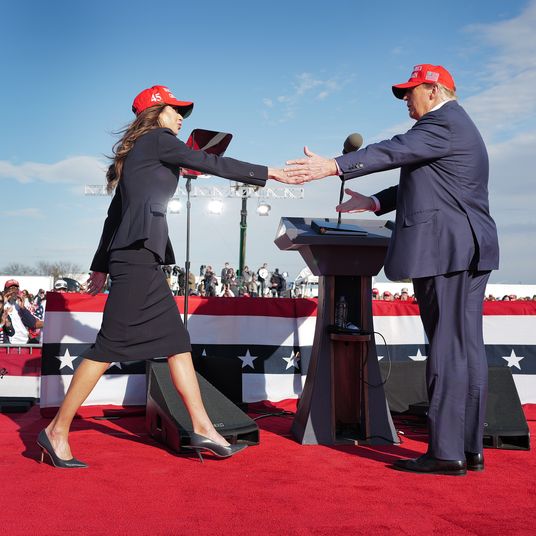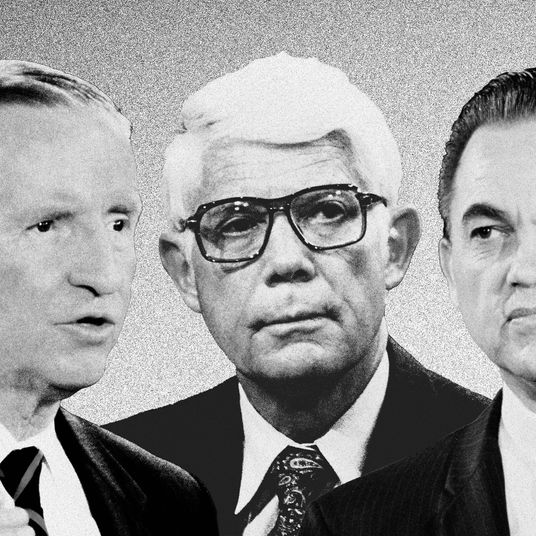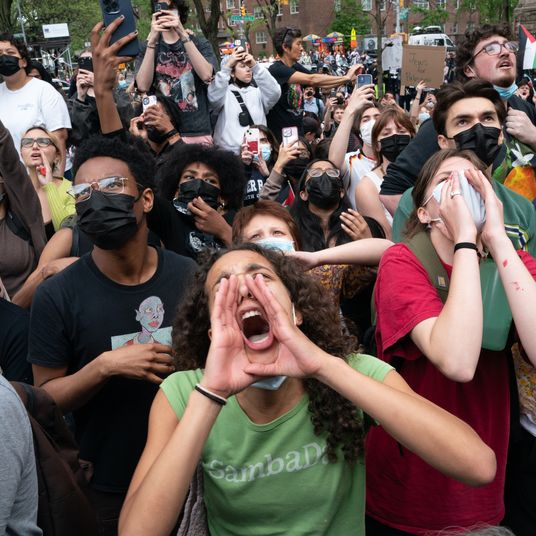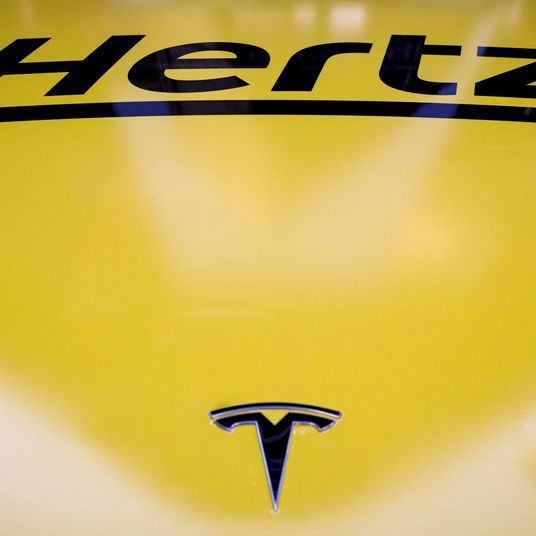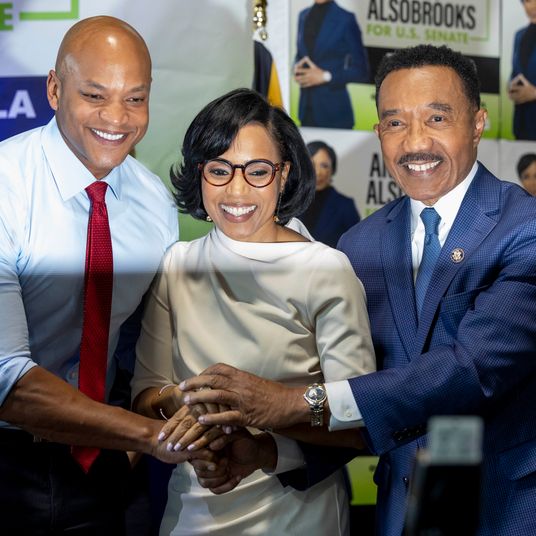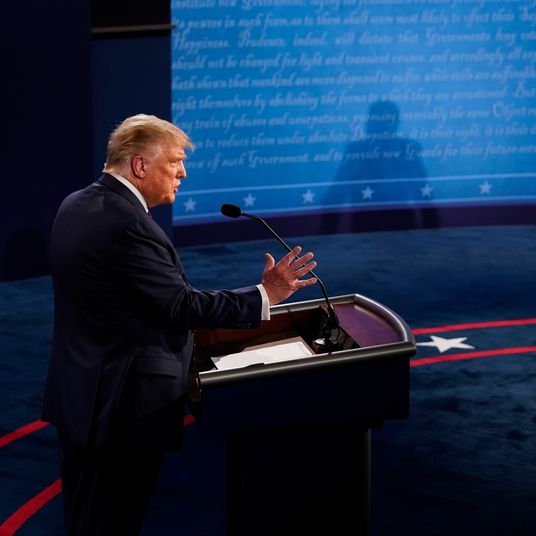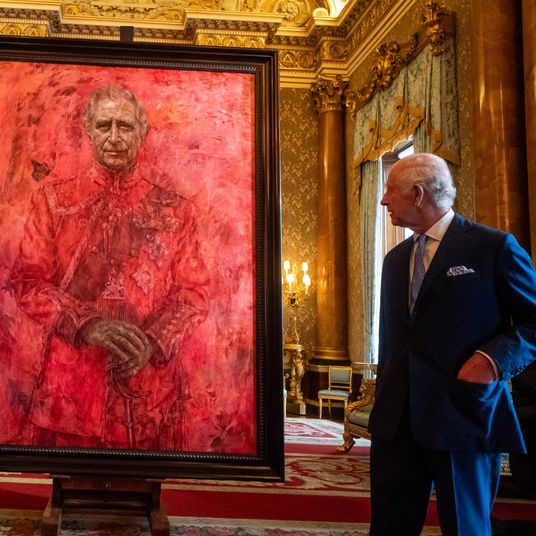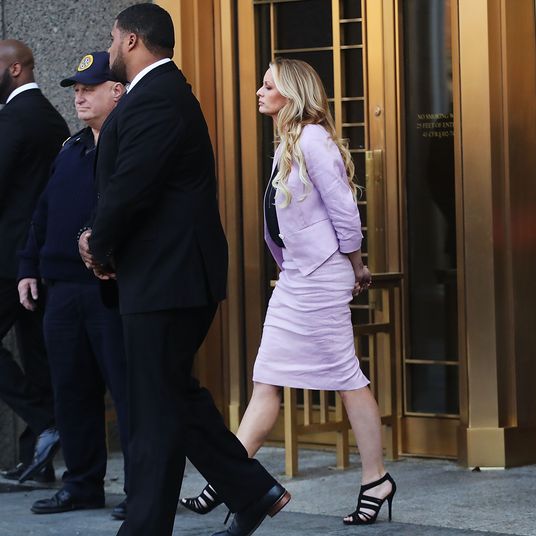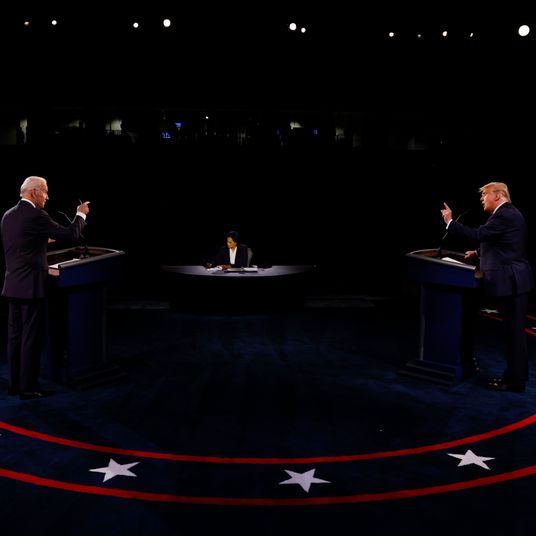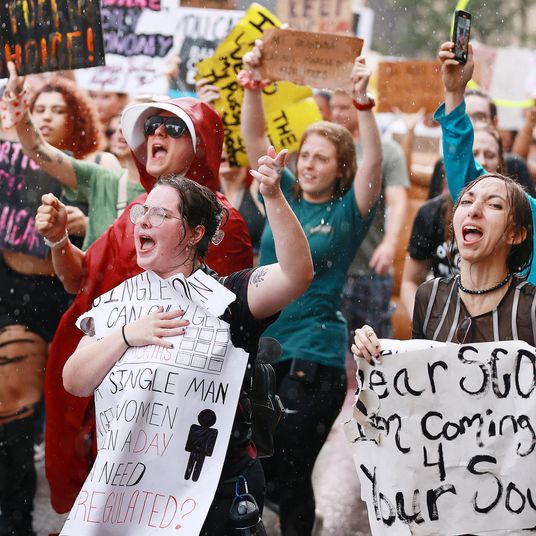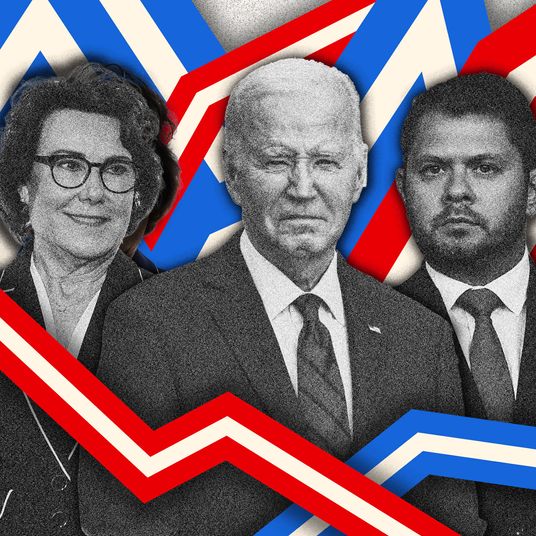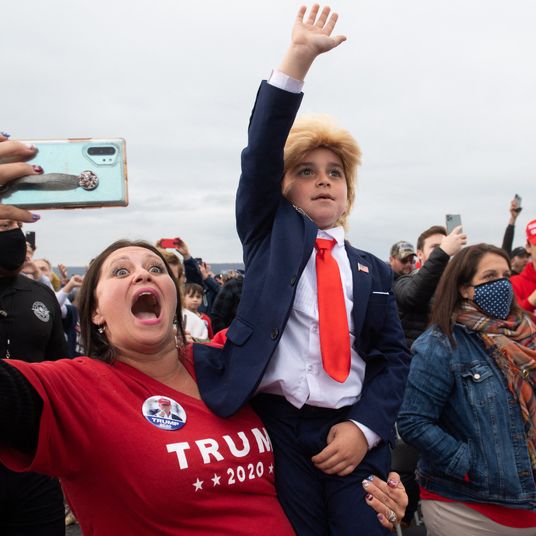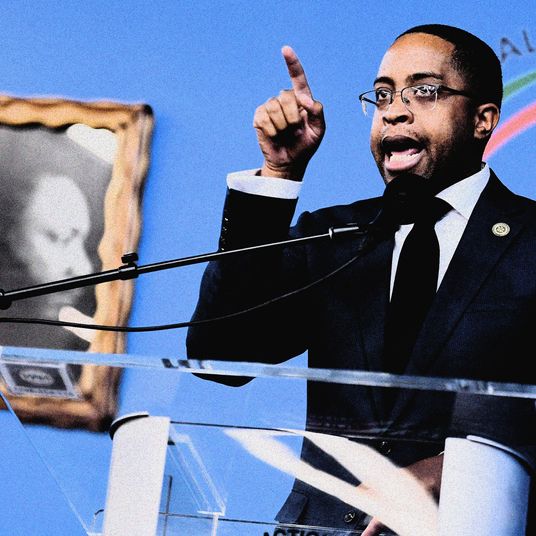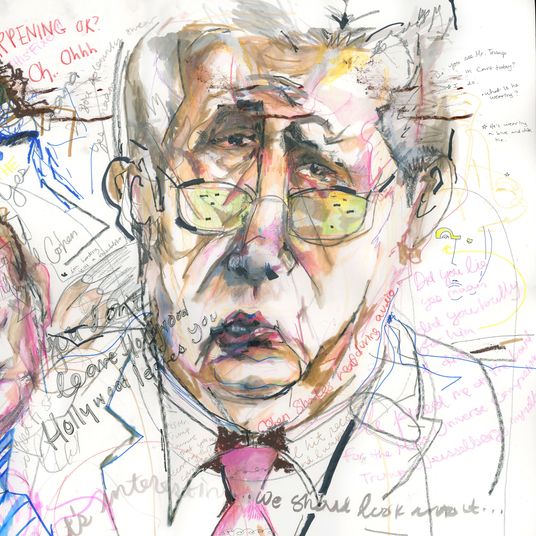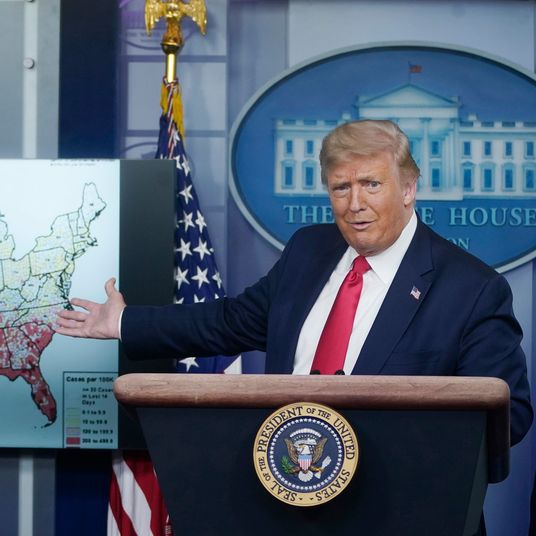
The president is a champion of “the working class” who spent much of his adult life stiffing contractors, fleecing small investors, and publicly arguing that coal miners are people who were born too stupid to understand the concept of black lung disease. He is an expert manager whose incompetence is so flagrant and egregious, Republican senators have described it as a threat to global security. He is a supporter of universal health care who tried to throw millions of Americans off of Medicaid, and an opponent of tax breaks for the wealthy who passed giant tax breaks for the wealthy — and then, mere hours later, told the members of his ritzy golf resort, “you all just got a lot richer.”
He is a “law and order” president who encourages police officers to break the law, an anti-corruption crusader who openly argued that the Justice Department’s top priority should be protecting his private interests, a proponent of strict adherence to federal information-security protocols who refused to stop making calls on an unsecured iPhone that the Chinese government had bugged, an advocate for America’s servicemen and women who made it easier for predatory lenders to scam veterans, and, above all, a teller of hard truths who tells bald-faced lies just about every time he opens his mouth.
And when he says that he is doing a great job, 42 percent of Americans believe him.
Many see that last fact as an indictment of the news media. After all, it is the Fourth Estate’s job to expose the lies and pretenses of the powerful, and maintain enough credibility with voters of all stripes to ensure that objective reality remains relevant to our civic life. And Donald Trump’s success at both winning the White House — and subsequently, consolidating power over the Republican Party — suggests the media has failed woefully at that latter task.
In a recent interview with CNN’s Christiane Amanpour, Jon Stewart made a version of this argument. Specifically, the former Daily Show host suggested that mainstream journalists’ visceral response to Trump’s attacks on the press have helped the president obscure his policy failures, and “win the fight.”
I think that journalists have taken it personally. They’re personally wounded and offended by this man. He baits them, and they dive in. And what he’s done well, I thought, is he’s appealed to their own narcissism, to their own ego. Because what he says is, “These are the” — and the journalists stand up and say, “We are noble. We are honorable. How dare you, sir?” And they take it personally. And now he’s changed the conversation to not that his policies are silly or not working or any of those other things; it’s all about the fight. He’s able to tune out everything else and get people just focused on that fight. And he’s going to win that fight.
Stewart’s analysis struck a chord with a wide variety of political observers, among them, the conservative journalist Byron York, left-wing contrarian Glenn Greenwald, Washington Post news analyst Aaron Blake, CNN anchor Jake Tapper, a smattering of democratic socialists, and Cher.
And there is certainly some truth to Stewart’s remarks. The Trump era has produced plenty of needless grandstanding and performative indignation from American reporters who (for the moment) enjoy a historically exceptional degree of journalistic freedom and personal security. And it is also true that the news media often puts disproportionate weight on offenses against itself, in a manner that might alienate outsiders. For example, Mohammed bin Salman’s decision to engineer a famine in the Middle East’s poorest country — thereby condemning thousands of Yemeni children to malnutrition and death by starvation — did not prevent America’s finest newspapers from hailing the Saudi crown prince as a progressive reformer; only his (apparent) involvement in the murder of a Washington Post columnist could do that.
All of that said, Stewart’s suggestion that mainstream reporters have failed to communicate the truth about Trump’s “silly” policies — because they’ve become too emotionally affected by the president’s conduct, and thus, have allowed their interactions with Trump to devolve into a fight, which he has won — seems misguided on a number of levels. To name each in turn:
1. It is not Jim Acosta’s wounded narcissism that leads CNN to cover Trump’s rhetorical excesses more obsessively than the details of his regulatory policies. Rather, as Stewart suggests earlier in the same interview, it is the profit motive: A segment (or blog post) about the reality-star president’s latest tirade will, on average, attract a far larger audience than an analysis of the EPA’s decision to loosen restrictions on methane emissions. And as long as we require (the vast majority of) news outlets to operate as for-profit enterprises — and force them to compete for an ever-shrinking pool of ad dollars — the media “conversation” will circle around shiny objects.
2. Trump isn’t “winning” with most Americans. Market pressures aside, mainstream news outlets have actually done a decent job of alerting the public to the key details of the president’s major policies. For much of the last year, Trump claimed that his tax plan would primarily help the middle class, and provide no benefit to the wealthy. In reality, the law delivered the lion’s share of its benefits to the one percent.
Mainstream news outlets reported this fact — and the vast majority of Americans believed them: According to a poll commissioned by the Republican National Committee in September, 61 percent of voters believe that the GOP tax cuts favored “large corporations and rich Americans” over “middle-class families,” while just 30 percent think the opposite.
Similarly, the Republican Party has spent millions of dollars this election season trying to convince voters that it supports maintaining regulatory protections for people with preexisting medical conditions. Mainstream news outlets have pointed out that these claims are contradicted by the party’s support for ongoing litigation and legislation that would eliminate those protections — and polls suggest most voters do not take the GOP’s word on the issue.
More broadly, Americans see “the news media” as being more trustworthy (on policy issues) than Donald Trump is, by a margin of 54 to 30 percent, according to a recent Quinnipiac poll. Meanwhile, the president has a historically low approval rating — amid historically low unemployment and historically high consumer confidence — and his party is on pace to lose the popular vote in next week’s congressional elections by a historically large margin. If the president is “winning the fight” with the press, it isn’t because he’s swaying public opinion — but rather, because the anti-majoritarian structures of our government have robbed public opinion of political relevance.
3. The Republican base’s distrust for the mainstream media probably has more to do with their party’s vast (anti–mainstream media) propaganda apparatus than with the egotism of some White House correspondents. The idea that Trump has retained the avid support of 40 percent of voters — because mainstream reporters have turned them off with their self-aggrandizing antics — actually aggrandizes mainstream reporters.
There is little basis for believing that the “fake news” media could win back the trust of Trump voters, if only its reporters didn’t take the president’s acts of incitement against the press so personally. Partisan identity is a powerful force, particularly in a nation as socially polarized as our own. Human beings are hardwired to seek confirmation of their existing beliefs, and to find reasons to dismiss information that contradicts their priors — and this is especially true when said beliefs undergird a powerful group identity. Meanwhile, the nation’s most-watched cable news network, most-listened to talk radio shows, and largest owner of local TV news stations all comport themselves as propaganda arms of the Republican Party — which is to say, they relentlessly reinforce GOP voters’ partisan prejudices.
Any American who identifies strongly with the president has a profound incentive to distrust those who report on his actions in (anything resembling) objective terms. To accept that the New York Times is a credible newspaper would require such a person to accept that Donald Trump is a grotesquely incompetent, pathological liar — which is to say, it would require a Trump supporter to forfeit a core aspect of her self-conception, and, in many cases, alienate herself from most of the people she knows and loves. It is difficult to imagine many Trump supporters putting themselves through that when a “fair and balanced” news channel — and the most-shared articles on Facebook — are constantly assuring them that the Times is “fake news.”
4. The mainstream media’s coverage of the Trump administration hasn’t been adversarial enough. Earlier this week, the president announced that he was sending 5,200 U.S. soldiers to the border, in response to an imminent “invasion” of the United States by a caravan of violent, Central American criminals.
In reality, the primary objective of “Operation Faithful Patriot” is to deny American voters the opportunity to make a well-informed decision at the ballot box next Tuesday. The White House knows that the caravan of Central American migrants will not reach the United States for weeks (if ever); that the caravan is not populated by “Middle Eastern” terrorists and violent gang members; that U.S. soldiers are legally prohibited from enforcing immigration law; and that the migrants have a legal right to apply for asylum in the United States. The president is leading voters to think otherwise because he has concluded that his party will do better in the midterm elections if voters falsely believe that their nation is under siege.
In fact, the president believes that his party’s electoral fortunes are so dependent on conjuring the phantom threat of an impending invasion, he has persisted in spreading lies about that threat even in the face of mounting evidence that such conspiracy theories could inspire acts of political violence.
The mainstream media is not “the enemy of the people” — but it should be the enemy of any politician who deceives voters, and tells lies that put marginalized people in physical danger. Which is to say: It should look to viewers at home like CNN is at war with the Trump administration — because the Trump administration is at war with the Fourth Estate’s most fundamental values.
There are reasonable arguments for nonpartisan news outlets to maintain official neutrality on policy questions. But the main problem with the GOP’s current position on healthcare isn’t that it is too conservative, but that it is a bald-faced lie. If political parties can win elections by crafting fictional threats and policy positions — and broadcasting them over party-affiliated organs that are disguised as objective news sources — then actual political journalists will have little reason to exist.
A fundamental fact about American politics, circa 2018, is that one of the two major political parties has realized its policy priorities are profoundly unpopular, and, instead of changing those priorities, has decided to compensate for their unpopularity by lying to its own voters about its intentions, while doing everything it can to disenfranchise those whom it can’t deceive. In this context, it is not possible for mainstream news outlets to give voters a clear picture of political reality while actively trying to avoid the appearance of being in a “fight” with the Republican president.
And, far too often, the press prioritizes the latter. As Tom Scocca writes:
Outside governance and electoral politics, the press understands that you don’t have to respectfully give liars and crooks space to operate. You pound them, because your job is to tell the truth about things, and the truth about lies and crimes is news. If Trump were a slumlord, holding 10,000 tenants in misery by running his properties the way he runs the presidency, no one would challenge the right of a newspaper to crusade against him, to hammer every story about his corruption and abuse until his business failed.
Instead, because he’s in charge of the mightiest country in the world, the press treats his lies and abuses as the basic terms everyone else has to live under. He yells about the caravan, and the caravan has to be treated as a serious news story. He declares the Fourteenth Amendment void, and the smarmy Axios reporter smiles along — and then, as the story moves out into the rest of the press, the status of his power to nullify the Fourteenth Amendment becomes “unclear.” His lie that no other country grants birthright citizenship gets published verbatim, as news, and only after that does it begin to get desperately, retroactively fact-checked
All of which is to say: If mainstream reporters take Jon Stewart’s analysis as an argument for the supreme importance of projecting a disinterested attitude towards the authoritarian demagogue in the Oval Office, then the satirist’s latest attempt to restore sanity will be no more useful than his last one.






